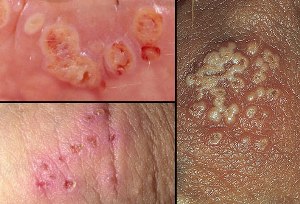Vaginal Herpes Causes
Most women know that genital or vaginal herpes is a contagious disease caused by the herpes simplex virus which is transmitted through sexual intercourse, even oral sex. But do you know that there are 3 versions of the herpes simplex and not all of them are true STDs?
According to US Department of Veterans Affairs, the 3 kinds of herpes simplex virus are:-
- Herpes simplex virus type 1 (HSV-1) which is the most common type and infecting millions of people every year causing cold sores and blisters in and around the mouth.
- Herpes simplex virus type 2 (HSV-2) is commonly associated with genital herpes and is manifested as open sores and painful blisters in the genitals, buttocks and anal area. However HSV-1 can also cause herpes in the genital region.
- Shingles – the last type of the herpes virus (herpes zoster) is known as shingles. It usually invades the body after a person had chicken pox, and the shingles virus remain dormant in the cells of the body. Generally shingles do not appear until adulthood.
Symptoms Of Vaginal Herpes
Herpes does not always produce symptoms. If it does, the symptoms vary with each person. Or it can be so mild that they are not aware that they are infected.
But for some people, the infection may manifest as an initial outbreak of itchy and painful sores within two to 14 days after being exposed to the virus.
What Does An Initial Vaginal Herpes Outbreak Look Like
During an initial outbreak, small red bumps in the form of fluid-filled blisters group in clusters in the genital and anal area. Within a few days the blisters break open, leaving painfully exposed open sores.
These sores may be accompanied by flu-like symptoms such as swollen glands, fever, chills, muscles aches, fatigue and nausea. They may also have abnormal vaginal discharge and pain during urination.
An initial outbreak may last from two to three weeks. The blisters will heal over, forming scabs that will fall off. At this point the virus has gone into remission, hidden well inside your nerves. At this dormant state, the virus can still be transmitted through unprotected sex.
Newly infected victims can expect to have three to five outbreaks within the first year of diagnosis. Over time, subsequent flare-ups are less severe with longer intervals between each outbreak.
However, vaginal genital herpes can be severe in people with impaired immune systems such as people with HIV.
Vaginal Herpes Treatment
There is no cure for vaginal herpes. It is a life-long condition. But antiviral medicine can:-
- Shorten the outbreaks
- Relieve the pain and itchy
- Help sores heal faster
- Prevent transmission of the virus to your sexual partner.
According to research, diet and stress can trigger an outbreak. So managing your stress level and eating a healthy diet can help to prevent those sores from popping up.
Prevention
During outbreaks, the virus can be very contagious. The following steps can speed healing, prevent the infection from spreading to other sites of the body or to other people:-
- Keep the infected area clean and dry.
- Try not to touch the sores and wash your hands thoroughly after touching them.
- Avoid any form of sexual contact from the time the symptoms appear until the sores have healed. As long as a woman is sexually active, you will be at risk of contracting vaginal genital herpes.
- The best prevention is to practice safe sex and be in a mutually monogamous relationship.
- Use latex condoms to reduce the risk of contracting the virus. It is effective as long as the condom remains unbroken and completely protects all areas of the penis that is in contact with the vagina.
- Other than vaginal sex, the condom must be used for other forms of sexual contact – oral, anal and manual sex as it is skin contact that transmits the herpes virus, not semen.
- If one of you have oral herpes, be very cautious about performing oral sex on your partner, as that could transmit the virus. Using a dental dam, a latex condom to cover the penis or a female condom to shield the vaginal area could reduce the risk of transmission.
Pregnancy & Herpes
If you’re pregnant and have herpes, your doctor may suggest that you have your baby by C-section.
Why? During vaginal birth, the herpes virus could spread to your baby, especially if your first outbreak happens around the delivery time. The virus could give your baby rashes, eye problems, or more serious issues.
A C-section makes that less likely. Your doctor may also have you take anti-viral medicine as your due date gets closer.
It is not easy living with vaginal herpes but with the above preventive measures, you can still have a healthy sex life.
- Home
- Vaginal Infection
- Vaginal Herpes



Facebook Comments
Thanks for visiting. Have your say on what you just read? Leave a comment in the box below!